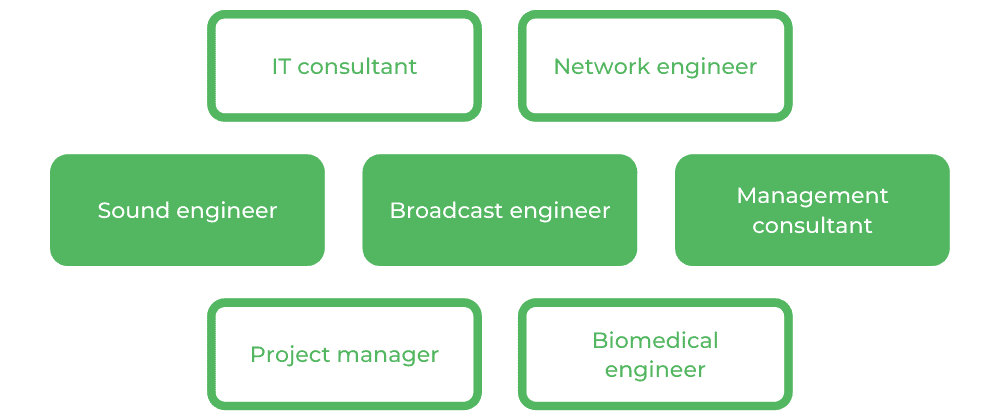Now that you know all about Electrical Engineering at UNSW, you may want to know this degree looks like week-to week. Will you love it? Are there things that perhaps aren’t so great?
We’ve chatted with two students, Rebecca (a fourth year student) and Reuben (a fifth year student), to find out exactly what it’s like to study this degree! They’ve both had different experiences, so you should get a really well rounded overview.
Okay, let’s kick off with some questions for Rebecca!
Why should you study an Electrical Engineering degree at UNSW?
Top 3 Pros of an Electrical Engineering Degree
Top 3 Cons of an Electrical Engineering Degree
Mistakes You Shouldn’t Make
Things to Know Before Starting UNSW Electrical Engineering
What Makes this Degree Different
Motivations for Studying UNSW Electrical Engineering
Potential Career Paths
Why should you study an Electrical Engineering degree at UNSW?
As you can read, there are many perks to studying Electrical Engineering at UNSW. It’s a four-year program that teaches you many different aspects of electricity.
You will learn about big projects like powering a street or city, right down to smaller things like how computers are created.
Top 3 Pros of an Electrical Engineering degree
#1: Practical study
Rebecca said that by studying this degree, you will learn to problem solve with efficiency. This is taught right from the foundations of first year, and spans into the Industry Training that you take on in your final Honours year.
While working on the job, you’ll start to understand how engineers think on their feet and resolve complex matters.
“It definitely teaches you how to think logically,” Rebeca said. “You learn how to work autonomously through your thesis, and how to manage a project. You learn the engineering design process as well.”
#2: Versatile knowledge
This really is a degree where you’ll get to know all the key skills around electrical design and understanding. You will be set up for taking on projects big and small.
“The Electrical Engineering degree really spans from learning the hardware on your computer and how to code that, all the way through to power and energy engineering — like how the energy in the wire that’s in the streets is generated. It’s really super versatile,” Rebecca explained.
As we’ve discussed before, you’ll be taking on subjects that tackle analogue electronics and signal processing, but you’ll also learn about digital communications and taking on large projects.
#3: Built-in Honours!
Honours is compulsory in this degree, which means that you are straight into your final and most competitive year without having to apply.
Though this can add some additional pressure to perform well throughout the degree, it also means that you are guaranteed access to specialist teachers and the final year of Industry Training.
Completing the Honours program also increases your chances of employment, as you’ll have that edge on your competitors from other unis!
Top 3 Cons of an Electrical Engineering degree
#1: This is a hard degree
There’s no beating around the bush here — studying Electrical Engineering is hard work. You will need to be up to date on complex technology, while having great maths skills and working at a fast pace.
“The content is quite heavy… and it’s a lot of equations, so you’ll be solving problems in the exams where you have to remember equations and processes and stuff,” Rebecca said.
While this may be challenging (and you may see a few tears), it’s a great lesson in persistence!
“My degree has really taught me how to persevere. Even if you really don’t get something, or really think you won’t get through something, you just have to keep on going. That’s probably the biggest thing I’ve learnt from my degree,” Rebecca said.
#2: Assessment-heavy
In addition to the first con, Electrical Engineering at UNSW has a lot of assessments, so you’ll have to constantly be on the ball and get things done.
“Usually one assessment would be lab work and that usually consists of handing something in weekly or fortnightly and then you might have a final lab report or project at the end… On top of that, it’s quizzes and exams during the term. I think all my final exams have always been worth over 40%,” Rebecca said.
If you enjoy working hard and ticking off objectives, this may be a great structure for you. Regardless, it’s something to be aware of.
#3: Limited support for finding your Industry Training placement
Rebecca explained that students must find their final Industry Training on their own. You can expect to be contacting employers and sending in your own portfolio for jobs.
“There’s not really much support for that. Lots of the engineering firms will have student Engineering positions because they know it’s compulsory, but I know if you didn’t get one of those, it would be quite hard to scramble and get the 60 days,” she said.
One of the biggest things is that you must be astute and ready to snap up positions as they come!
Now that we’ve heard what Rebecca has to say, we’ll get to know how Reuben feels about studying Electrical Engineering at UNSW.
Any regrets?
“[I regret] focussing only on the academics in first year, and not getting involved in societies and extracurriculars. Lifelong friends are formed in the first year, and these will be of more value than a few extra marks,” Reuben shared.
This totally makes sense! ELSOC is, as we’ve discussed before, one of the biggest and most established societies at UNSW — it’s certainly worth getting involved. Even if you don’t, it’s great to carve out some time to spend with people from your classes.
“Just don’t fail anything though!” Reuben added.
What do you wish you had known before starting UNSW Electrical Engineering?
Reuben explained that, like he talked about above, he really wished he had known how valuable social activities are during uni.
You may not remember all the classes, exams or your precise marks, but you will remember the people you studied with and the ones you got to interact with at society events and whatnot.
What makes this degree different from the ones offered at other universities?
This is an important question, because it will help you decide exactly what uni you should enrol at. From social life, to admin, to classes, there’s a lot to consider! Fortunately, Reuben broke it down for us.
What inspired you to choose UNSW Electrical Engineering?
Like many students, Reuben’s interest in his degree began at school through class work.
“I chose this degree after doing some electrical/electronics work while at school. I wanted to know how and why these things worked rather than just building them off a drawing,” said Reuben.
Even if you don’t have an early understanding of what you want to study like Reuben did, that’s okay! You can explore these articles and talk to people to figure out what the right degree is for you.
What are the possible career paths?
Your career path within Engineering is really going to depend on your major and what you most enjoy. There are a lot of graduate engineering positions available in versatile fields. You may go into any of the following:
-
- IT consultant
- Network engineer
- Sound engineer
- Broadcast engineer
- Management consultant
- Project manager
- Biomedical engineer
And there you have it! Now you have learned from two experienced students all you need to know about Electrical Engineering at UNSW.
As you can see, every person has a different experience of uni. That’s totally normal, and proves that UNSW accommodates different types of students. This is a great degree, and one that may be the perfect fit for you — whatever that ends up meaning!
Lucinda Garbutt-Young hopes to one day be writing for a big-shot newspaper… or maybe just for a friendly magazine in the arts sector. Right now, she is enjoying studying a Bachelor of Public Communication (Public Relations and Journalism) at UTS while she writes on the side. She also loves making coffees for people in her job as a barista, and loves nothing more than a sun shower.






